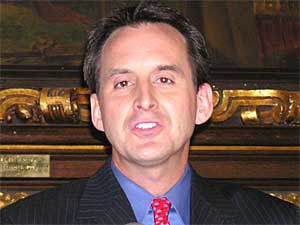Audio
Photos
More from MPR
Respond to this story
| |||||||||||||||||||||||
Governor urged to drop no-tax-increase pledge
December 2, 2004
 |
| Despite calls for him to reconsider, Gov. Pawlenty is standing firm on his pledge not to raise state taxes to solve the state's budget deficit. (MPR Photo/Laura McCallum) |
St. Paul, Minn. — If there's a sacred cow in the Minnesota budget, it's K-12 education. The governor and legislative leaders from both houses and both parties have all expressed an interest in boosting school funding next session after several no-growth years. But being first in line for new spending may not be worth much when the state itself is pleading poverty.
"We've cut all the fat. That was about two years ago," says Bob Meeks, executive director of the Minnesota School Boards Association. "We cut into the bone a year ago. There's not much left to cut. We'd like to start building back. That's to fund the basic program. That's not to build Taj Mahals or to provide luxuries. That's basic."
Meeks says it's time now for lawmakers and the governor to consider tax increases not just to erase the deficit, but to cover up to $400 million in additional school funding.
Marcia Avner of the Minnesota Council of Nonprofits says the current financial straits are the direct results of past deficit fixes that, she says, merely delayed the inevitable.
|
What we're seeing is the cumulative effect of political decisions that we've made over past years -- and that, really, the only options available in this legislative session would be revenues or cuts.
- Marcia Avner, Minnesota Council of Nonprofits |
"What we're seeing is the cumulative effect of political decisions that we've made over past years -- and that, really, the only options available in this legislative session would be revenues or cuts," says Avner.
Avner says the state has been through three rounds of spending cuts -- and that it's time to address the revenue ledger.
It's an argument Gov. Pawlenty doesn't buy. Pawlenty points out that revenue collections are, in fact, projected to rise roughly 3 percent in the next budget. The problem, he says, is that spending will rise even faster if it's not trimmed back.
"So all these folks running around the state -- some of them -- writing letters to the editor and stuff, saying, 'You know what? We've got to have increased tax revenues,' we've got them! Because the economy's growing. And that's without raising tax rates," says the governor.
Pawlenty notes, for example, that spending in state-subsidized health care has ballooned dramatically during the last few years. To provide the current level of health care service will cost 20 percent more next biennium if it's not trimmed back. The governor says that's where the problem lies -- and not with inadequate taxation.
But Wayne Cox of the union-backed Citizens for Tax Justice says the governor's approach is simply a plan to pull the rug out from under low-income Minnesotans.
"Those are real people out there with real health care needs, and the system simply charges more for those services," says Cox. "But the Republican approach is, 'Well, let's just deny them a certain portion of the services. Let's have triage,' something like that."
Cox says voters rejected that approach in November when Democrats picked up 13 seats in the state House, bringing them within a hair's breadth of taking the majority in that chamber.
But DFLers, too, are reluctant to talk about tax increases. Top Democrats in the House and the Senate say they're not ready to propose tax hikes, and will wait to see the governor's hand first. Interest groups, however, were more than ready to propose new taxes.
Eliot Seide is the executive director of the state's largest public employees union, the American Federation of State, County, and Municipal Employees, Council 5. He says past budget cuts merely patched up the problem by passing costs on to cities and counties, and by raising a host of fees.
"We've had taxes, but they've been selected taxes on selected people. The patient is ill. It's time to use all the tools available," says Seide.
Pawlenty, however, says he'll stick to his pledge not to raise state taxes. He also says he'll close the projected deficit gap. And he says he'll boost education spending. What he hasn't said is how. The answer should come late in January when he releases his budget proposal.
|
News Headlines
|
Related Subjects
|

